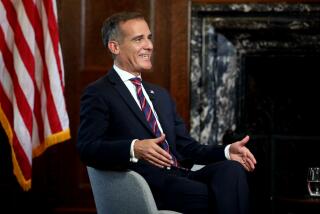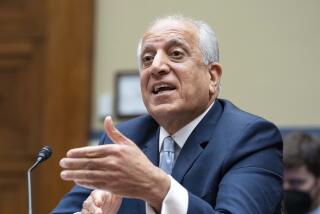In region he oversaw, a mixed review for Holbrooke
- Share via
Reporting from Kabul, Afghanistan — Richard C. Holbrooke is being praised in the United States after his death as a giant of diplomacy, but in South Asia, the turbulent region that constituted his last assignment, his legacy received mixed reviews.
In Kabul, he was regarded as out of touch with the society and too combative to forge a meaningful partnership with Afghanistan’s leadership. But in Islamabad, Pakistan, he was lauded as a seasoned envoy who earnestly tried to strengthen Washington’s fragile alliance with the country.
The 69-year-old career diplomat, the special U.S. envoy to Afghanistan and Pakistan, died at a Washington hospital Monday of a ruptured aorta.
Among the intelligentsia in Kabul, the Afghan capital, some said there had been so much bad blood between the pugilistic Holbrooke and the government of President Hamid Karzai that the diplomat had long ago lost his effectiveness. Others said they admired him for standing up to Karzai. Many spoke on condition of anonymity, saying it was either too soon or pointless to tarnish the reputation of a dead man.
They criticized Holbrooke as a “bulldozer” who didn’t understand the courtly Afghan temperament or dismissed him as a powerless functionary trumped by Army Gen. David H. Petraeus, commander of U.S. forces in Afghanistan, or Vice President Joe Biden, who has taken a deep interest in South Asia.
But even those critical of his style acknowledged that he was right on the major issues, especially on the way Pakistan’s inner dynamics affect Afghanistan. And even Afghans who didn’t think he was very important described his sudden death as a potential setback in the wobbly U.S. commitment to Afghanistan.
Candace Rondeaux, a Kabul-based analyst at the International Crisis Group, a think tank and advocacy organization, noted that Holbrooke’s death came not many months after another sudden departure, that of Army Gen. Stanley A. McChrystal, Petraeus’ predecessor.
“His efforts were admirable because he made a lot of trips to Afghanistan and Pakistan in an effort to forge an understanding between the two countries,” said Sultan Ali Oruzgani, a former longtime governor who remains close to the Karzai administration. “He made Pakistan’s role in Afghans’ troubles clear.”
Holbrooke was hobbled by what appeared to be the Obama administration’s lack of faith in his efforts, Afghan officials and analysts said. “He didn’t really have a chance to prove himself. He was kept away from Afghanistan, and kept on a short leash in Washington,” said one who spoke on condition of anonymity out of respect for Holbrooke’s family. “There were regular rumors that he was on his way out.”
In Pakistan, government leaders praised Holbrooke for his efforts to broaden the relationship between Washington and Islamabad, which for many years has been viewed through the narrow prism of confronting terrorism. On his frequent visits to the Pakistani capital, Holbrooke persistently promoted the Obama administration’s push to help Pakistan tackle its biggest priorities, including shortages of electricity, a severe water supply crisis and a moribund economy.
Prime Minister Yousuf Raza Gilani said Holbrooke “left no corners unturned to broaden and deepen this partnership.”
President Asif Ali Zardari said “Pakistan has lost a friend. He was an accomplished and experienced diplomat who quickly gained the confidence of his interlocutors. He was a key player … in confronting militancy in our part of the world.”
Opponents of the United States tried to exploit Holbrooke’s demise. A Taliban spokesman Tuesday likened the death of the special U.S. envoy to Afghanistan to the fates of several Soviet leaders who oversaw the invasion and occupation of the country and died one after another in the early 1980s.
Qari Yousef Ahmadi compared Holbrooke’s death to those of Leonid Brezhnev, Yuri Andropov and Konstantin Chernenko, who were among the architects of Moscow’s ill-fated, decadelong foray into Afghanistan.
“He was grappling with a constant psychological stress,” the Taliban message said of Holbrooke. “The same was the case with the former Soviet Union as the crisis reached its climax.... [The Soviet leaders] relieved themselves of the hard task of the Afghan mission by retreating into the lap of death.”
Times staff writer Alex Rodriguez in Islamabad contributed to this report.
More to Read
Sign up for Essential California
The most important California stories and recommendations in your inbox every morning.
You may occasionally receive promotional content from the Los Angeles Times.










